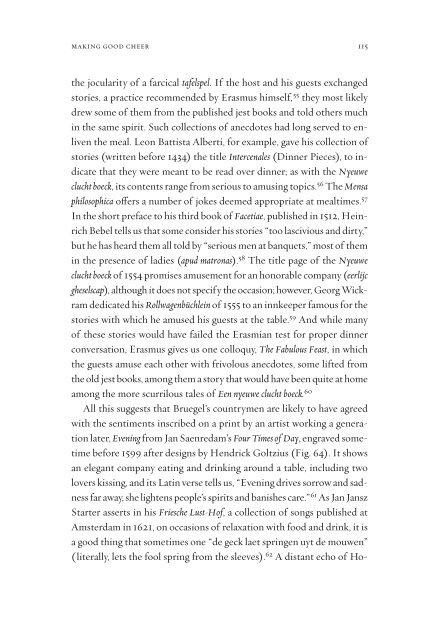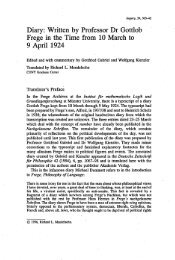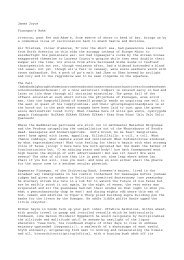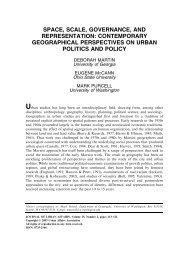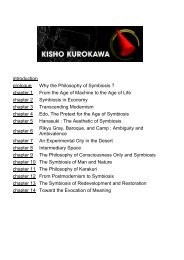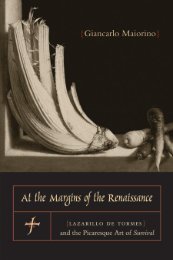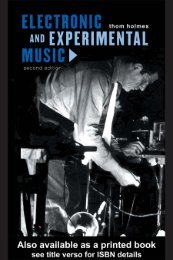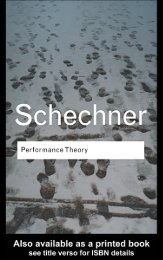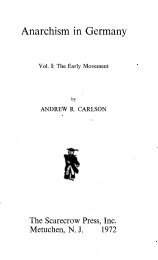Pieter Bruegel and the Art of Laughter - AAAARG.ORG
Pieter Bruegel and the Art of Laughter - AAAARG.ORG
Pieter Bruegel and the Art of Laughter - AAAARG.ORG
You also want an ePaper? Increase the reach of your titles
YUMPU automatically turns print PDFs into web optimized ePapers that Google loves.
making good cheer 115<br />
<strong>the</strong> jocularity <strong>of</strong> a farcical tafelspel. If <strong>the</strong> host <strong>and</strong> his guests exchanged<br />
stories, a practice recommended by Erasmus himself, 55 <strong>the</strong>y most likely<br />
drew some <strong>of</strong> <strong>the</strong>m from <strong>the</strong> published jest books <strong>and</strong> told o<strong>the</strong>rs much<br />
in <strong>the</strong> same spirit. Such collections <strong>of</strong> anecdotes had long served to enliven<br />
<strong>the</strong> meal. Leon Battista Alberti, for example, gave his collection <strong>of</strong><br />
stories (written before 1434) <strong>the</strong> title Intercenales (Dinner Pieces), to indicate<br />
that <strong>the</strong>y were meant to be read over dinner; as with <strong>the</strong> Nyeuwe<br />
clucht boeck, its contents range from serious to amusing topics. 56 The Mensa<br />
philosophica oªers a number <strong>of</strong> jokes deemed appropriate at mealtimes. 57<br />
In <strong>the</strong> short preface to his third book <strong>of</strong> Facetiae, published in 1512, Heinrich<br />
Bebel tells us that some consider his stories “too lascivious <strong>and</strong> dirty,”<br />
but he has heard <strong>the</strong>m all told by “serious men at banquets,” most <strong>of</strong> <strong>the</strong>m<br />
in <strong>the</strong> presence <strong>of</strong> ladies (apud matronas). 58 The title page <strong>of</strong> <strong>the</strong> Nyeuwe<br />
clucht boeck <strong>of</strong> 1554 promises amusement for an honorable company (eerlijc<br />
gheselscap), although it does not specify <strong>the</strong> occasion; however, Georg Wickram<br />
dedicated his Rollwagenbüchlein <strong>of</strong> 1555 to an innkeeper famous for <strong>the</strong><br />
stories with which he amused his guests at <strong>the</strong> table. 59 And while many<br />
<strong>of</strong> <strong>the</strong>se stories would have failed <strong>the</strong> Erasmian test for proper dinner<br />
conversation, Erasmus gives us one colloquy, The Fabulous Feast, in which<br />
<strong>the</strong> guests amuse each o<strong>the</strong>r with frivolous anecdotes, some lifted from<br />
<strong>the</strong> old jest books, among <strong>the</strong>m a story that would have been quite at home<br />
among <strong>the</strong> more scurrilous tales <strong>of</strong> Een nyeuwe clucht boeck. 60<br />
All this suggests that <strong>Bruegel</strong>’s countrymen are likely to have agreed<br />
with <strong>the</strong> sentiments inscribed on a print by an artist working a generation<br />
later, Evening from Jan Saenredam’s Four Times <strong>of</strong> Day, engraved sometime<br />
before 1599 after designs by Hendrick Goltzius (Fig. 64). It shows<br />
an elegant company eating <strong>and</strong> drinking around a table, including two<br />
lovers kissing, <strong>and</strong> its Latin verse tells us, “Evening drives sorrow <strong>and</strong> sadness<br />
far away, she lightens people’s spirits <strong>and</strong> banishes care.” 61 As Jan Jansz<br />
Starter asserts in his Friesche Lust-H<strong>of</strong>, a collection <strong>of</strong> songs published at<br />
Amsterdam in 1621, on occasions <strong>of</strong> relaxation with food <strong>and</strong> drink, it is<br />
a good thing that sometimes one “de geck laet springen uyt de mouwen”<br />
( literally, lets <strong>the</strong> fool spring from <strong>the</strong> sleeves). 62 A distant echo <strong>of</strong> Ho


